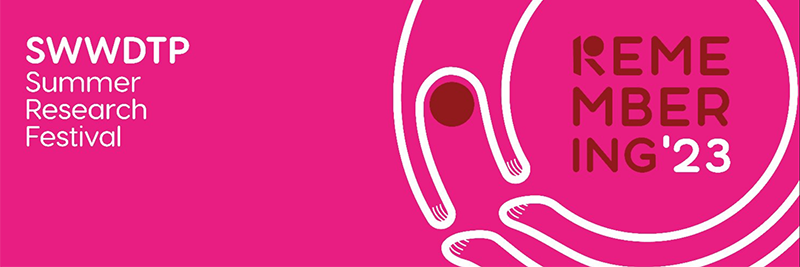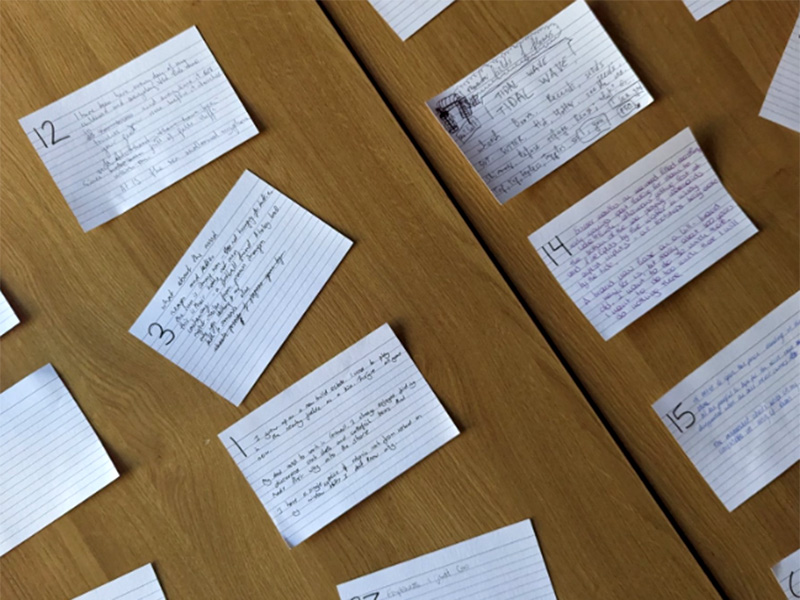
Held in a hybrid format in Aberystwyth and online, the SWWDTP celebrated its third iteration of the student-led Summer Research Festival from the 14th-16th June 2023. Martina Biavati and Katy Humberstone look back at this year’s events.
The Summer Research Festival (or SRF as it has become to be known among DTP members), offers a chance for students (both SWWDTP-funded and based elsewhere), creative practitioners and members of the public to engage in a three-day celebration of the diverse research activities being undertaken within the SWWDTP.
Every year the SWWDTP students chose the thematic area: for 2023, the theme of the festival centred around memory and, in particular, the act of remembering. This theme aimed to build on the two previous years of SWWDTP festivals, in which we both looked forward to the future (Futures, the 2021 theme) and inward to the processes of change that bring about the future (Changes, the theme for 2022). For 2023, we turned to the ways in which societies and cultures make sense of the world and its possibilities through acts of remembering.

This year’s theme, Remembering, invited participants to interrogate the act of remembrance in its broadest sense. We wanted to critically consider how the past is transmitted through time and different political powers, and how marginalised voices experience and relate to it through their own systems of reference. But we also wished to consider the past as something tangible, to touch and feel. To that end, we sought to think about how the past is translated from an event or story into a physical object, how, and with what criteria, it is conserved and preserved in museums, archives, monuments, and the very topography of the places that we live in, in the communities that we are a part of.
The range of contributions put forward by students for the festival was rich and inspiring; as a student-led organising committee, we arranged contributions to align with five core panels, spread across the three festival days. These included:
- Ancient Memory and Archaeology;
- Remembering in museums;
- Remembering through art;
- Remembering throughout history;
- Expressing memory and identity in media.
These themes enabled a rich range of perspectives to be brought to the table through each thematic panel.
The festival not only comprised more ‘traditional-style’ conference papers, but also roundtable panels delivered by the SWWDTP’s active research clusters. These research clusters are consortium-wide, around which students interested in a particular societal issue or theme come together to undertake different research activities.
During the Festival, we were also delighted to facilitate a number of creative workshops, during which festival participants had the opportunity to consider issues of memory and remembering through creative writing and poetry approaches, producing some poignant and thought-provoking pieces of writing in a short time span.

Each festival day was also ‘headlined’ by inspiring keynote speakers who discussed some important issues around PhD life. On the first day, we were pleased to welcome Dr Emma Brodzisnki and Professor Laurajane Smith. Emma Brodzisnki is the founder of the PhD life raft, a consultancy which aims to help researchers like ourselves navigate the peaks and troughs of our doctoral journeys, both academically and personally.
Laurajane Smith is Professor of Heritage and Museum Studies at the Australian National University. Both Emma and Laurajane joined forces for the first keynote of our festival, which also doubled-up as an episode recorded for Emma’s PhD life raft podcast.
During the session, Emma and Laurajane engaged in a lively discussion around how best to navigate intellectual disagreements during the PhD journey, with Laurajane providing inspiring insights around this topic through examples from her heritage-focused career trajectory.
As organisers, we thought that this hybrid session-recorded podcast format worked particularly well, and it is great for us as students to have a record of the discussion to reflect back on at a later date, as well as being a resource which other PhD students might find helpful.
During the second day, we were pleased to welcome Kaelyn Grace Apple as our second keynote speaker. Kaelyn is a PhD student at Yale University in the United States, and alongside this, works as a Digital Entrepreneur and Business Coach aiming to improve digital literacy skills and the personal online branding of academics across the sector. Kaelyn gave a great talk about building a personal brand and identity as an early career academic.
All in all, the festival was very successful. As a committee, we have benefitted from the opportunity to project manage and run a large-scale academic event, which for many of us was the first time doing so; these are skills which we look forward to further developing in the future. The lively exchange of ideas and participation during the festival was a joy to witness.
An initial worry we had was whether we had organised the thematic panels in a way which would bring all the contributions under a given umbrella ‘theme’ into dialogue as much as possible: this was appeased by the high-quality contributions we received. The themes, purposefully kept vague, worked well and the multiplicity of approaches or subjects under each precisely served to reflect the complex and multifaceted nature of issues of remembering.
The combined keynote delivery-podcast was an additional highlight, and we think that this provides an effective avenue to have a lasting repository or ‘record’ of the festival discussions once the event has concluded.
In total about 40 people attended and contributed to the festival either in person or online: for future festivals, we would suggest the team to focus on growing the audience during the months leading up to the festival and to have maybe an event or a part of the festival destined to engage with the broader local community.

Throughout the months before the festival and during the same, we promoted the event through the SRF (@SWWSummerFest) and the DTP’s (@SWWDTP) twitter accounts: we hope next year’s team will improve upon the social media presence of the festival in order to gather an even wider (and hopefully non-entirely-academic) audience.
We write these reflections with a view to handing over the reins to the next festival organising committee, which we are sure will do a superb job in the organisation of the fourth festival programmed for the summer of 2024. We very much look forward to learning the theme!
Categorised in: Student Blogs